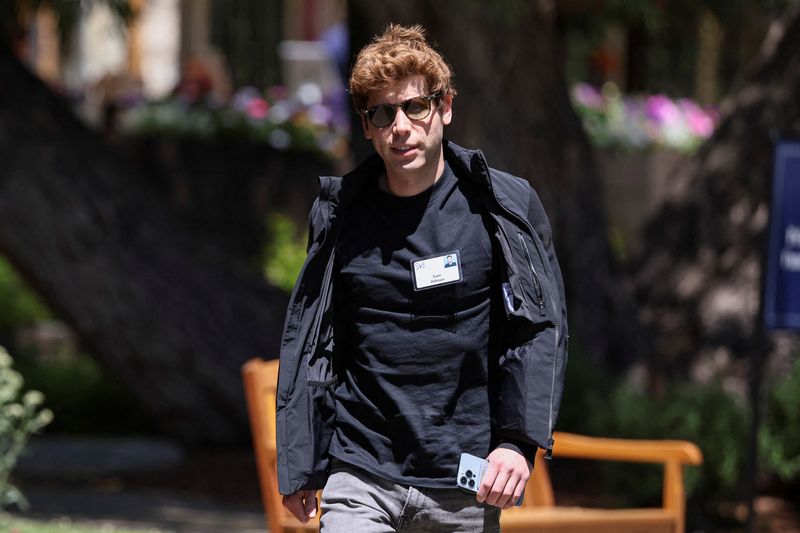Gold prices edge up amid Fed rate cut hopes; US-Russia talks awaited
Investing.com -- Today, OpenAI CEO Sam Altman joined a fireside chat at the Vanderbilt Summit on Modern Conflict and Emerging Threats, discussing the future of AI and its growing role in national security.
Looking ahead, Altman predicts a “push for better and better reasoning models” in AI. He envisions AI agents capable of completing full tasks, writing software, and acting as general-purpose tools with greater autonomy. He compared AI to a coworker, starting at an intern level but improving “better and better each quarter.”
OpenAI aims to achieve AGI (artificial general intelligence) and ensure it benefits the whole of humanity. When asked what the world will look like when AGI is achieved, Altman replied, “We can see a very tiny preview of it now.”
He argued that AI’s utility is no longer theoretical, citing ChatGPT’s popularity and ongoing growth. Although Altman conceded that AGI remains elusive, he noted, “It’s useful enough AI—it’s changing how early adopters work. You can access an AI that’s probably smarter than you in many ways.”
Moving forward, Altman envisions a world where everyone has an AI companion that “gets to know you throughout your life” and boosts productivity across various domains. His comments align with OpenAI’s announcement today of improvements to ChatGPT’s memory, aimed at enhancing usefulness and personalization for users.
The CEO emphasized AI’s potential in the scientific sector, particularly for developing cures for diseases, including cancer, with AI’s help. He noted that scientists using OpenAI’s models are reportedly “doubling their productivity—and this is very early in the game.”
Regarding AI in the national security sector, Altman believes that at its current pace of development, it will become one of the “most important inputs to national security.” He acknowledged OpenAI’s interest in deeper involvement but noted that some obstacles remain.
A core part of OpenAI’s mission to benefit humanity includes supporting the U.S. and its allies in upholding democracy and safety. When asked if OpenAI would help develop a weapon system, Altman didn’t rule it out, citing that “the world could get really weird.” However, he clarified, “In the foreseeable future, we would not do that, and I don’t think most of the world wants AI making weapons decisions.”
On a lighter note, OpenAI’s CEO revealed he no longer uses Google (NASDAQ:GOOGL), preferring ChatGPT instead. Many view AI chatbots as potential replacements for search engines, and Altman seems to agree, noting, “When I watch someone else do it, that’s a distant memory of how we used to try to find stuff.”
When asked about DeepSeek’s success, Altman highlighted two features that set it apart initially: offering an advanced model for free and displaying the model’s chain of thinking. However, he argued that the model itself wasn’t a breakthrough. He noted that DeepSeek’s release signals AGI’s potential to spread widely and intensifies competition in the AI sector.
On the balance of open-source and closed-source models, Altman said, “I’m sure the world needs both things,” but expressed a preference that open models be built on a U.S. stack. While acknowledging that open-source models will always have drawbacks, he emphasized two points: “A, there will be tremendously more good than bad, and B, it’s going to happen—I strongly believe an American company should provide the open-source stack that most of the world builds on.”
Additionally, Altman predicts that the costs of intelligence and energy will converge over time, with high-cost items like chips eventually being cheaply manufactured by robots and efficiently developed by AGI.
When asked when humanity will reach AGI, Altman replied, “We’re just on an exponential of models getting smarter, and that’s just gonna keep going. Where you draw the line may be different for different people.” He concluded that while some believe AGI has already been achieved, others may never agree. Regardless of whether or not people believe AGI has been achieved, the fact remains: AI continues to advance at a breakneck pace.
